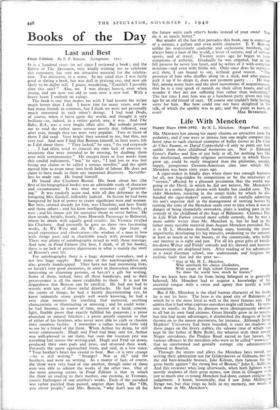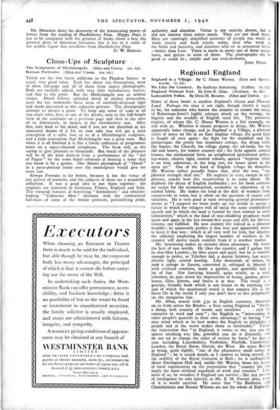Life With Mencken
Happy Days 1880-1892. By H. L. Mencken. (Kegan Paul. 15s.)
MR. MENCKEN has among his many charms an attractive taste for pedantry, and if one were to imitate him one might compare this latest opus to such classical examples of belles lettres as Du Cote de Chez Swann, or David Copperfield—if only to point out how unlike them these childhood memories are. Nor is Edmund Gosse's Father and Son of any help at all, for nothing less like the intellectual, morbidly religious environment in which Gosse grew up, could be easily imagined than the philistine, secular, happy, prosperous German-American clan into which Mr. Mencken was born sixty years ago.
A cigar-maker in kindly days when there was enough business
for all, not hag-ridden by competition or by the necessities of " service," affected by a pleasant pessimism that the world was going to the Devil, in which he did not believe, Mr. Mencken's father is a comic figure drawn with kindly but candid care. The elder Mencken, rejoicing in the smart tricks by which he dis- banded the cigar-makers' union, or silently if ruefully admitting his son's superior skill in the management of trotting horses by turning the reins of the Mencken outfit over to him when it was in danger of being shamefully overtaken, plays a leading part in the comedy of the childhood of the Sage of Baltimore. Clarence Day in Life With Father created more subtle comedy, for he was a more subtle writer than Mr. Mencken is, but he had in his father more suitable material than August Mencken provided. No, it is H. L. Mencken himself, hating cops, learning the piano imperfectly, developing his leg muscles, awakening to the interest, at least as much as to the beauty, of the countryside, who holds our interest as is right and just. For all his great gifts of knock- me-down Weber and Fields' comedy and his shrewd and humane conservatism are displayed here. After reading of his adventures in a local German school, one understands and forgives the stylistic fault that led the poet to- " Sing of Mr. H. L. Mencken Who interlards his choice Geddnken,
With scraps of high school German prose To show the world how much he knows."
For we learn here that far from being bilingual as is generally believed, Mr. Mencken had to acquire a knowledge of his ancestral tongue with a sweat and agony that justify a little ostentation.
But if Mr. Mencken is the chief human character of his book, he is not its hero. The hero is the good city of Baltimore, of which he is the most loyal as well as the most famous son. He admits that it had what captious outsiders might call faults. In sum- mer its smells, its flies, its diseases were obstreperously obvious to all but its own fond citizens. Grass literally grew in its streets, but that had many advantages; it diminished the dangers of being thrown on to the mossy pavements, for instance. Although Johns Hopkins' University had been founded, it casts no shadows in these pages on the livery stables, the saloons (one of which Was kept by the father of Babe Ruth), the wharves with their rowdy Negro stevedores, the Pimlico Road sacred to fast horses, the various offences to the moralists who were to be called " wowsers ' that an unreformed and genially corrupt city administration allowed to flourish.
Through the streets and alleys the Mencken boys roved, re- serving their admiration not for Gildersleeves or Gilmans, but for the old bare-knuckle bruiser, Jake Kilrain, then famous for his great battle against " the strong boy of Boston," John L. Sullivan. And this reviewer who, long afterwards, when both fighters were merely shadows of their great names, saw them in Glasgow with just as much awe as young Mencken had done, cannot criticise the judgement. I know, historically, that I saw John Millington Synge too, but that rings no bells in my memory, nor would it have done in Mr. Mencken's.
Mr. Mencken dates his discovery of the intoxicating power of letters from the reading of Huckleberry Finn. Happy Days is not to be compared with the greatest of books about a boy, the greatest glory of American literature, but it has in it some of the golden liquor that overflows from Huckleberry Finn.
D. W. BROGAN.







































 Previous page
Previous page